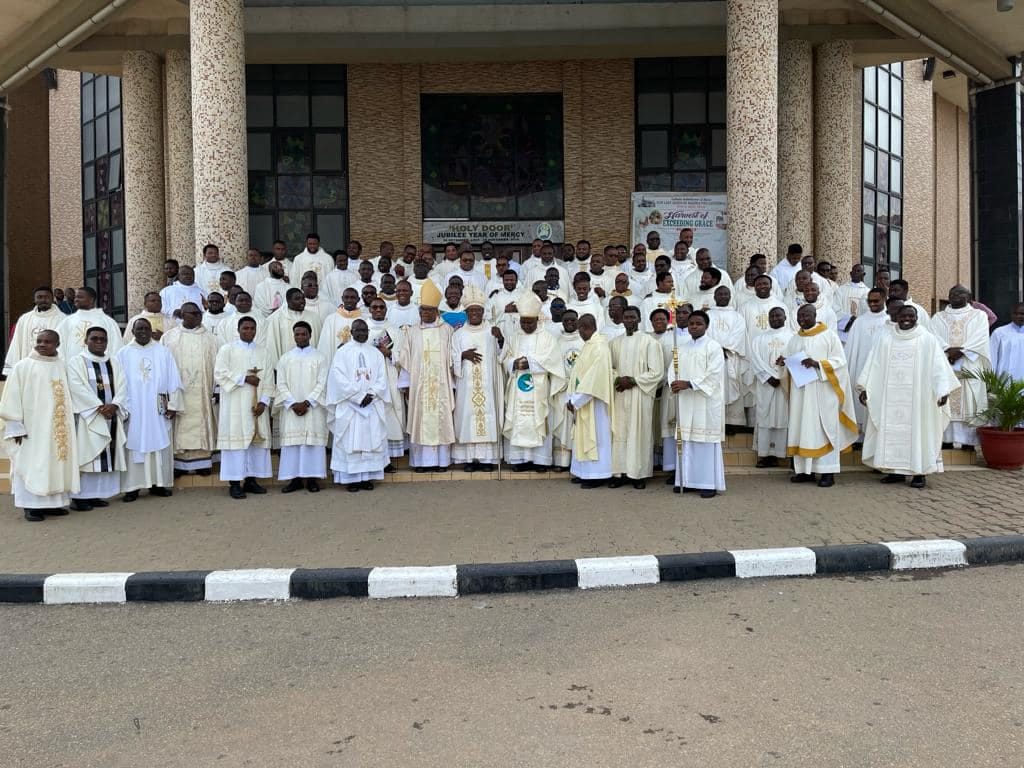A diocese in Nigeria’s capital city has developed innovative ways of combating contemporary challenges confronting marriage and the family.
This disclosure is contained in a pastoral message which came as a fruit of the just concluded 4th General Assembly of the Catholic Archdiocese of Abuja which held at Our Lady Queen of Nigeria Pro-Cathedral, Garki, Abuja from Thursday 9 to Saturday, 11 Nov.
The event which drew participants from all parishes across the Archdiocese had the theme, “Marriage and family in the contemporary society,” made a case for the most “cherished Christian ideals of love, fidelity, spirituality and discipline.”
The document signed by the metropolitan of Abuja, Archbishop Ignatius A. Kaigama and the diocesan chancellor, Fr. Sam Tumba had 12-point modern recipes/resolutions aimed at revamping the most cherished values of family and marital life.
“Celibate priests and religious are called to a life of purity”
“We call on married couples to marital fidelity just as our celibate priests and religious are called to a life of purity” they stated while stressing that “the family is the natural context for childbearing. We discourage the recent trends of having babies outside of marriage.”
On what constitutes a good Christian family, the assembly insisted that “it is built on the foundation of prayer” while urging, families to “revive the culture of observing the angelus, prayer before meals and other Catholic devotions together.”
Directing all parishes, pastoral areas, and chaplaincies to organize frequent retreats, workshops, and seminars for singles, intending and married couples, the document encouraged priests to “take personal interest in these aspects of preparing prospective couples” including “marriage sponsors” who are charged to “also be actively involved in the process.”
Observing that “some families are in grave danger of breakdown due to marital and family crisis,” the diocese advised “priests and other pastoral agents …to sacrifice quality time and attention to resolving family challenges [through] spiritual, human, moral and catechetical,” teachings.
They used the occasion to “condemn the undue pressure on young people to rush into marriage without a proper understanding of its meaning and significance” and “encouraged families to resist erroneous, erosive and pervasive ideologies of contemporary society that undermines the institution of marriage and family life.”
The Archdiocese equally commended “families who have remained faithful to their marital vows and responsibilities as parents,” while urging “other families to emulate their good example, [by volunteering] their time and wealth of experiences in preparing spouses for marriage.”
Citing the scriptures (Cf. Matthew 19:12), delegates acknowledged that single, marital, and priestly lives constitute noble vocations while discouraging every form of mistreatment of unmarried ladies or men.
Archdiocese of Abuja called on “the government at all levels to implement policies and programmes that alleviate poverty, unemployment, insecurity and disease to help families to thrive” even as it recommended that “the fruits of this assembly be stepped down to all parishes, pastoral areas and chaplaincies before the next Archdiocesan General Assembly.”
Drawing lessons from Church documents such as Familiarias Consortio 13, the African diocese underlined that “the Church teaches that marriage is in fulfilment of the scriptural command of God to be fruitful, multiply and fill the earth” (Cf. Gn. 1:27-28).
On the place of African values in the Christian family, the assembly insisted that, “the essential Christian values of marriage such as unity and indissolubility have become accepted and lived out in our African Christian context.”
Embrace honourable aspects cultural life
They advocated for a profound “integration of whatever is good, true and just from our traditional African values into the Christian family” and other “honourable aspects of our cultural marriage practices such as the communitarian spirit, value of preserving human life, respect for human sexuality and fidelity that enrich family living in our cultural, economic, social and political space.”
According to the document, “deliberate efforts must be made to break away from the dysfunctional elements of the African marriage system such as marital infidelity, widow inheritance, break-up of childless marriages and mistreatment of barren women and widows.
“Families can be truly happy on account of the love that reigns in the home and not determined by luxurious living, childbearing, and material wealth. Families should be encouraged to live out the gospel values and Christian marriage in a way that is distinctively African and truly Christian.”
They decried challenges facing the family in contemporary society such as “the poisonous ideologies of relativism, modernism, materialism, individualism and secularism” arguing that “these erroneous lines of thought are manifested in the clamour for a redefinition of marriage and family to include same sex union, habitual cohabitation and artificial means of sexual gratification, procreation and birth control.”
On the economic malaise confronting the rich oil nation, the “situation of our country makes it difficult for families to thrive” as “many families are paying a high price on account of poverty, unemployment and social deprivation,” they lamented.
They bemoaned other deficits of good leadership and the poor implementation of national policies which leads “to the cycle of violent conflict, terrorism, banditry, kidnapping and other criminal activities continue to impact negatively on the stability of the family” regretting that as a result, “families continue to suffer loss of life and property, displacement from their homes and means of livelihood.”
On the pastoral care for the family, the Archdiocese disclosed that its resource centre, Gaudium et Spes Institute, Asokoro offers essential pastoral services for the renewal of the family and marriage life.
It further pledged “to revamp the activities and implement the policies of [the Family and Human Life Commission for] the preservation of Christian family values among the faithful,” through marriage course, counselling, retreats, seminars, and workshops under the auspices of this commission.
The Archdiocese committed to invest resources in the formation of young people especially towards upholding family values stressing that “such pastoral care is aimed at providing Catholic moral formation on responsible parenthood, natural family planning, spiritual growth and a holistic family life.”



